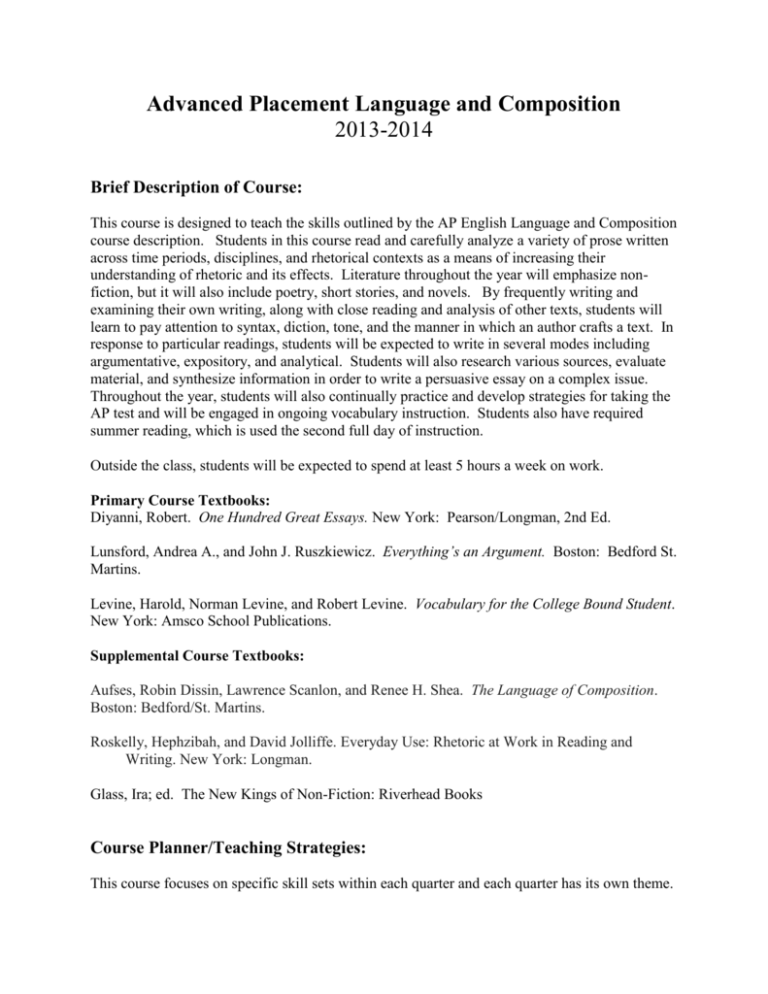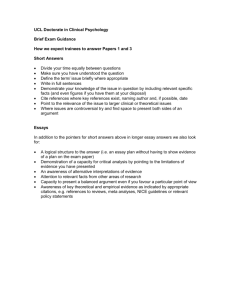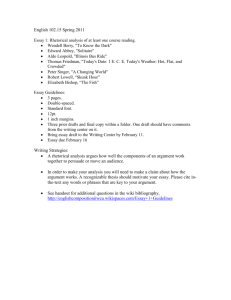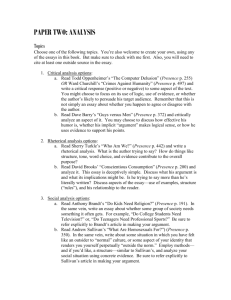
Advanced Placement Language and Composition
2013-2014
Brief Description of Course:
This course is designed to teach the skills outlined by the AP English Language and Composition
course description. Students in this course read and carefully analyze a variety of prose written
across time periods, disciplines, and rhetorical contexts as a means of increasing their
understanding of rhetoric and its effects. Literature throughout the year will emphasize nonfiction, but it will also include poetry, short stories, and novels. By frequently writing and
examining their own writing, along with close reading and analysis of other texts, students will
learn to pay attention to syntax, diction, tone, and the manner in which an author crafts a text. In
response to particular readings, students will be expected to write in several modes including
argumentative, expository, and analytical. Students will also research various sources, evaluate
material, and synthesize information in order to write a persuasive essay on a complex issue.
Throughout the year, students will also continually practice and develop strategies for taking the
AP test and will be engaged in ongoing vocabulary instruction. Students also have required
summer reading, which is used the second full day of instruction.
Outside the class, students will be expected to spend at least 5 hours a week on work.
Primary Course Textbooks:
Diyanni, Robert. One Hundred Great Essays. New York: Pearson/Longman, 2nd Ed.
Lunsford, Andrea A., and John J. Ruszkiewicz. Everything’s an Argument. Boston: Bedford St.
Martins.
Levine, Harold, Norman Levine, and Robert Levine. Vocabulary for the College Bound Student.
New York: Amsco School Publications.
Supplemental Course Textbooks:
Aufses, Robin Dissin, Lawrence Scanlon, and Renee H. Shea. The Language of Composition.
Boston: Bedford/St. Martins.
Roskelly, Hephzibah, and David Jolliffe. Everyday Use: Rhetoric at Work in Reading and
Writing. New York: Longman.
Glass, Ira; ed. The New Kings of Non-Fiction: Riverhead Books
Course Planner/Teaching Strategies:
This course focuses on specific skill sets within each quarter and each quarter has its own theme.
1st Quarter - Introduction to the course, Evaluation of summer reading, Close
reading/annotation, Rhetorical Analysis
Texts:
“I Want a Wife” Judy Brady
“9-11 Speech” George W. Bush
“Back to School Speech” Barack Obama
Huck Finn Mark Twain
“Shooting an Elephant” Orwell
“All I know is What I Read in the Papers” Klosterman
“The Lady or the Tiger” Klosterman
“Ice Planet Goth” Klosterman
Excerpts from Finn Jon Clinch
Florence Kelley AP Test Prompt
Culture Shock video
“The Allegory of the Cave” Plato
Current articles from The Atlantic, The New Yorker, and other sources to supplement discussions
Content/Skills Taught:
To begin the year, students will be challenged to write an essay that examines the work of Joseph
Heller in Catch-22 or Ernest Hemingway’s The Sun Also Rises through the lens of Stephen
King’s On Writing. The intent of the starting the year with this assignment is to help them begin
recognizing the ways an author crafts his or her text. This will also be aided by the examination
of context through author issue, purpose, and evidence. Following this assignment, students will
be introduced to the primary texts of the class: Everything’s an Argument, 100 Essays, and
Vocabulary for the College Bound Student. They will also be introduced to ongoing units such
as the writing portfolio and vocabulary.
The vocabulary book teaches students the roots and origins of the roots; students will be required
to periodically take tests on the roots as well as selected words from lessons. Students will keep
track of their vocabulary work within their journals. They will also be required to fulfill a
journaling requirement periodically that will require them to respond to challenging questions or
points of view as a means of practicing their rhetorical skills as they develop. The journals will
also contain 2 column notes (a dialectical journal) and 4 column notes (organized in the
following manner: a quotation, paraphrase, rhetorical strategy, and effect/function.)
Students will also be introduced to the study of rhetoric and will work through chapter one of
Everyday Use. They will also be working through chapters 1-5 in Everything’s an Argument.
Major Assignments/Assessments:
Each quarter, students will have two to three major writing assignments. All major writing
assignments will require and encourage the use of the writing process, including conferencing
with the teacher. Students are required to use Turnitin.com and participate in the peer editing for
each essay through the website. These writing assignments will also be collected in an ongoing
writing portfolio; after each writing assignment, students will be required to write a reflection on
the essay, which will be reviewed at the end of each quarter and compiled at the end of the year.
The first assignment for this quarter (falling somewhere around week 5) asks students to
compare and contrast the author’s use of diction in specific scenes from Finn and Huck Finn.
To continue their work with rhetorical analysis, students will write a formal essay in response to
“Shooting an Elephant” by George Orwell. Students will be required to answer the following
question: “What devices does Orwell employ to push his political agenda? Develop your
response by referring to at least one other text from this quarter.” Following this essay, students
will also write an essay that requires them to select their own political agenda and to use diction
and the rhetorical skills they have learned to present it to people who oppose their view.
Students will demonstrate understanding of other readings through completing in class writing
exercises (most of which ask them to explain quotes from reading) and class discussions.
2nd Quarter - Evaluating & Developing an Argument and its purpose, Understanding
images as text, Using non-fiction as tone
The Scarlet Letter Nathanial Hawthorne
“Arriving at Perfection” Ben Franklin
“On Ben Franklin’s Virtues” - D.H. Lawrence
“The Hostess Diaries: My Year at a Hot Spot” Scales
“Southern-Fried Sex Kitten” Klosterman
“The American Man, Age Ten” Orlean
“Calculated Risks” K.C. Cole
Excerpts from “Kant’s Moral Philosophy” - an article published in Stanford’s Encyclopedia of
Philosophy
Various argument prompts from past AP exams
Current articles from The Atlantic, The New Yorker, and other sources to supplement discussions
Content/Skills Taught:
Students will continue working through selections (Chapters 6-9) from Everything’s an
Argument and will be introduced to the Toulmin method of argument, which they will use to
evaluate arguments from a variety of sources.
Major Assignments/Assessments:
The first writing assignment for the quarter will work as a transition into the focus on argument.
Students will write an essay where they will challenge, defend, or qualify Shelley’s comparison
of the false optimism as it relates to the French Revolution or Industrial Revolution. To be
successful, they will examine Shelley’s rhetorical choices and the effects of her tone, diction, and
syntax.
With the background knowledge of rhetoric, appeals, and argument, students will read a variety
of essays as a follow up to The Scarlett Letter. They will be required to write an essay where
they take one of the readings from class or and evaluate the rhetoric of a given author and declare
their personal stance in their response using Toulmin’s method.
Their next essay will require them to agree, disagree, or qualify with Kant’s statement “I ought
never to act except in such a way that I could also will that my maxim should become a universal
law.” They may use any structure for argument they would like, but they must be clear in their
use.
3rd Quarter - Evaluating and developing an argument, Recognizing and analyzing satire
and its effects, Intro to synthesis/research skills
The Grapes of Wrath John Steinbeck
Excerpts from Modernism’s Risky Business Alissa Karl
“The Geography of the Imagination” Guy Davenport
“The Communist Manifesto” Karl Marx and Friedrich Engels
“Politics and the English Language” Orwell
“Power Steer” Pollan
“Chomp Chomp” Klosterman
“King Corn” (Unknown)
Excerpts from Fast Food Nation & The Shame of a Nation
Current articles from The Atlantic, The New Yorker, and other sources to supplement discussions
Content/Skills Taught:
The third quarter will continue to spend time on analyzing the validity of assumptions, claims,
and warrants, as well as the related details. A majority of this quarter will be spent examining
rhetoric, its role in politics, and the impact political rhetoric has on the public. They will look at
wide variety of texts including political cartoons, speeches, artwork, poetry, essays, etc.
Major Assignments/Assessments:
After reading Steinbeck’s Grapes, students will write an essay responding to the political
implications and rhetorical style of Steinbeck, and will structure their argument based on the
Toulmin model. The students will be asked to examine the repercussions of capitalism during
the Great Depression.
For their second writing, students will also be evaluating political cartoons and the effectiveness
of the cartoon in making an argument. In addition, they will begin the essay by working in small
groups who will share their findings with the group. As practice, we will use the 2005 AP
question with the prompt from The Onion that requires students to recognize and understand
satire.
To continue synthesis practice, students will respond to the following prompt (modeled after the
AP synthesis prompts):
The United States has often been characterized as a society obsessed with the accumulation of
material possessions. So much so that popular novels, televisions shows, and movies are filled
with advertisements for fast food chains, clothing brands, electronics, etc.
Carefully read the following seven sources, including the introductory information of each
source. Then synthesize information from at least three of the sources and incorporate it into a
coherent, well-developed essay that identifies the extent to which consumerism in America has
an adverse effect on America.
4th Quarter - Developing/Expanding Synthesis Skills, Focused Prep for AP exam, Writing
Portfolio Completion
“Salvation” Langston Hughes
“Among the Thugs” Buford
“Jonathan Lebed’s Extracurricular Activities” Lewis
“My Repulican Journey” Savage
“Billy Sim” Klosterman
“What Happens When People Stop Being Polite” Klosterman
Beloved Toni Morrison
Excerpts from Playing in the Dark: Whiteness and the Literary Imagination by Toni Morrison
“How It Feels to Be Colored Me” Zora Neale Hurston
“Me Talk Pretty One Day” David Sedaris
“Graduation” Maya Angelou
Content/Skills Taught:
Students continue to refine synthesis skills and argument skills by completing assignments that
are more challenging than the ones in third quarter. We will also continue our work on the AP
test preparation, but more class time will be allotted for questions and extra practice. We will
conclude the year with a writing portfolio assignment where they will compile and complete a
variety of different writing modes.
Major Assignments/Assessments:
Students will develop their own synthesis prompts in groups, they will share them in class, and in
their same groups, they will write a group essay using another group’s prompt. The purpose of
this is two-fold. First, students will be reinforcing the research skills they developed during third
quarter and second, they have an opportunity to see the writing process develop from an earlier
stage. Students may use the topics discuss in relation to the readings from class or they may
develop their own.
Students will also be required to write an intensive research paper where they will continue to
enhance their information literacy. They will be working with effective means of gathering
information, evaluating information, using different forms of information, how to use MLA &
APA documentation (MLA will be the required formatting for the paper), and synthesizing
information. The goal for their essay is to find what information a person would need to know to
make an informed decision about a given current issue. The format of the prompt allows
students to pick a topic that is engaging to them, but to be successful in their essay, they will
have to look at multiple perspectives (liberal, conservative, in support of and against) and make a
claim based off of their research.
As a conclusion to their year, students will complete their writing portfolio. They will first write
an essay that reflects on their growth as a writer, their challenges and strengths as a writer, and
their future goals for their writing. They will also be required to revise 3 essays from the year
and turn in a compilation of what they feel is demonstrative of their writing. As a conclusion, we
will read “Graduation” by Maya Angelou and students will write a short memoir of their high
school (or entire school) career and their thoughts and predictions of their graduation day.







![Submission 68 [doc]](http://s3.studylib.net/store/data/008000926_1-fed8eecce2c352250fd5345b7293db49-300x300.png)